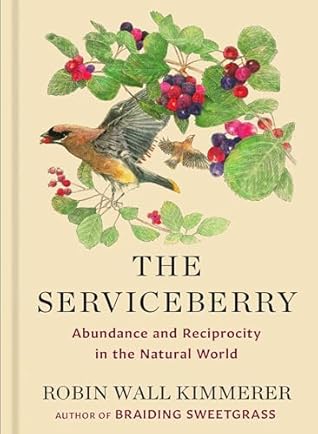More on this book
Community
Kindle Notes & Highlights
Read between
August 1 - August 29, 2025
This abundance of berries feels like a pure gift from the land. I have not earned, paid for, nor labored for them. There is no mathematics of worthiness that reckons I deserve them in any way. And yet here they are—along with the sun and the air and the birds and the rain, gathering in towers of cumulonimbi, a distant storm building. You could call them natural resources or ecosystem services, but the Robins and I know them as gifts. We both sing gratitude with our mouths full.
Instead of changing the land to suit their convenience, they changed themselves. Eating with the seasons is a way of honoring abundance, by going to meet it when and where it arrives.
A world of produce warehouses and grocery stores enables the practice of having what you want when you want it. We force the food to come to us, at considerable financial and ecological costs, rather than following the practice of taking what has been given to us, each in its own time. These Serviceberries were not coerced, and their carbon footprint is nothing. Maybe that’s why they taste so good—they come only this time of year—these ephemeral sips of summer, without the aftertaste of harm.
When we speak of these not as things or natural resources or commodities, but as gifts, our whole relationship to the natural world changes. In a traditional Anishinaabe economy, the land is the source of all goods and services, which are distributed in a kind of gift exchange: one life is given in support of another. The focus is on supporting the good of the people, not only an individual. Receiving a gift from the land is coupled to attached responsibilities of sharing, respect, reciprocity, and gratitude—of which you will be reminded.
This kind of gratitude is so much more than a polite “thank you.” Not an automatic ritual of “manners,” but a recognition of indebtedness that can stop you in your tracks—it brings you the realization that your life is nurtured from the body of Mother Earth.
It is not an empty metaphor that we call her Mother Earth. Food in our mouths is the thread that connects us in a relationship simultaneously spiritual and physical, as our bodies get fed and our spirits nourished by a sense of belonging, which is the most vital of foods.
I imagine if we acknowledged that everything we consume is the gift of Mother Earth, we would take better care of what we are given.


